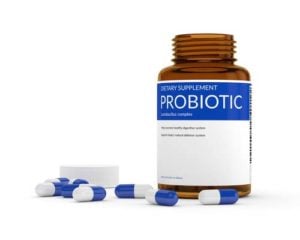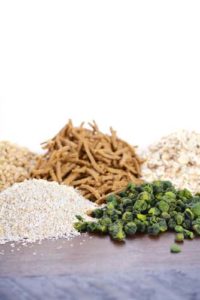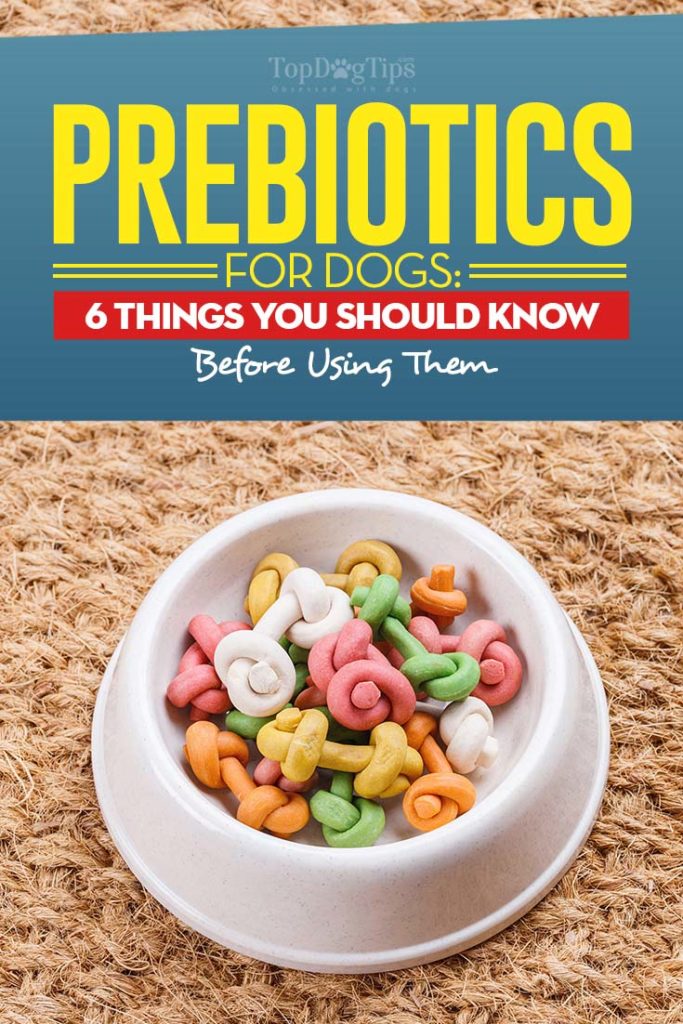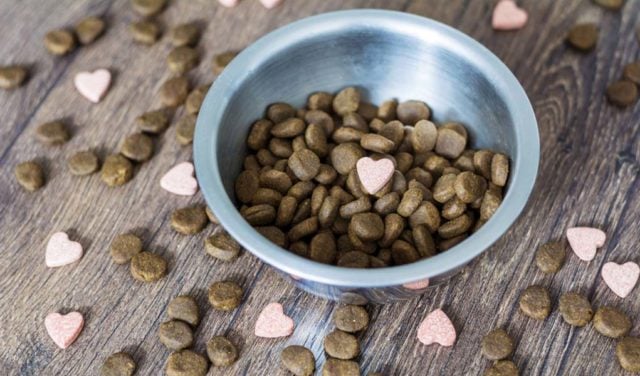
Table of Contents
A
t times, it feels impossible to keep up to date with everything to ensure the health of our dogs.
With these “to-do lists” getting longer, things get confusing fast.
Most dog owners have heard of probiotics and the benefits they provide for their pets, but what about prebiotics?
Here's what you should know about prebiotics for dogs.

Probiotics vs. Prebiotics for Dogs
The first question that leaves dog owners scratching is the difference between probiotics and prebiotics.
The general public has long understood probiotic supplements as providing beneficial bacteria that improve the dog's health in several ways.
This has been scientifically confirmed (study, study, study, study), and the supplements are now often recommended by veterinarians.
Prebiotics for dogs are much less known, and the term's similarity (the one-letter difference) doesn't help.
Here's the difference in short.
- Probiotics – live microorganisms are bacteria, the good/beneficial ones.
- Prebiotics – fiber (carbohydrate) that feeds the good bacteria in the gut.
Essentially, probiotics introduce good bacteria into the dog's gut, and prebiotics act as a fertilizer for the good bacteria that are already there.
As you can see, the two are closely related but are separate things and have entirely different purposes.
Because of what they are (fiber) and how easy it is to include them in the diet, prebiotics have been used in pet foods for decades, intentionally or not.
Probiotics, on the other hand, aren't that easy to include in the diet, mainly because it's live bacteria and need cold temperatures to survive.
In fact, while some pet food labels claim to contain probiotics, it's unlikely they have any effect (study).
A Brief on Probiotics
We must first understand probiotics and their use to better understand prebiotics for dogs and their effect. Storage is crucial—while there are probiotics that do not need to be refrigerated, evidence shows very low potency of those supplements.
All effective probiotics must contain live bacteria (like Bacillus coagulans, Biffidus spp., Acidophilus, and others) that must be refrigerated.
Proper maintenance of a dog's microbiota is crucial (study).
Studies show that probiotics improve gut flora which boosts the immune system in the digestive tract and body.
Ultimately, probiotics help your dog fight off diseases, strengthen the immune system, and protect him from various dangerous viruses like E.coli and more.
They can also help your dog overcome digestive upsets, diarrhea, colitis/IBD, etc.
For probiotics to have an effect, they must be given as a supplement.
A probiotic dog food will not have any effect.
There are several reasons for that:
- A large number of bacteria is required to have an effect, and the concentration of bacteria in dog food is nowhere near the minimum amount needed.
- Live cultures must be alive to have any impact, so they must always be refrigerated.
- Warm room temperatures will kill the bacteria, rendering the probiotic supplement useless.
With this out of the way, we can now examine prebiotics for dogs and how they can benefit your dog.
We'll also discuss why you should or shouldn't give your dog prebiotics and how they can be administered for the most effectiveness.
ALSO READ: 7 Vet Recommended Supplements for Dogs
The Best Prebiotics for Dogs
6 Things You Must Know
1. Prebiotics are Non-digestible
Prebiotics are fiber.
This means these various non-digestible food ingredients nourish the probiotic bacteria found naturally in your dog's gut and intestine.
Or you can opt to add via probiotic supplements, as discussed above.
Prebiotics, whether given through food or supplements, keep the good probiotic bacteria active.
Prebiotics also stimulate the growth and activity of many bacteria in your dog's colon and improve your pet's overall health (meta-review study).
The food ingredients travel undigested to the colon, fermenting and converting them to short-chain fatty acids (SCFAs).
These SCFAs inhibit the growth of harmful bacteria and promote and support healthy digestive flora in dogs.
It also acts as a source of energy for colon cells.
It preserves the electrolyte and fluid balance, allowing your dog's intestine to work properly.
2. Prebiotics are Found in Dog Foods
Because prebiotics are fiber (carbohydrate), they are already included in dog foods.
They are also found in other food sources known to contain soluble fiber, such as legumes, whole grains, fruits, and vegetables.
Beet pulp is another well-known prebiotic (commonly used in dog food), but care should be taken as some dogs don't process beet pulp well.
This may cause bloating, nausea, and flatulence.
Raw garlic (toxic to dogs in large amounts) and dandelion greens are good sources of prebiotics.
We touched on probiotics, which, according to the studies mentioned, have little to no effect when included in dog foods.
However, prebiotics for dogs can have the same positive impact, whether given through pet food, homemade food or as a prebiotic supplement.
The only thing that matters is the amount of prebiotics given.
Studies show that dogs fed prebiotics regularly are less likely to get diarrhea caused by the overgrowth of harmful bacteria (study).
Prebiotics will provide enhanced immune protection to the puppies through colostrum and milk when fed to females during pregnancy and lactation.
In turn, the puppies will have an enhanced response to vaccines.
For dogs with immuno-suppression or digestive disorders, and for all dogs on a course of antibiotics, prebiotics are definitely of extra value.
3. Prebiotics and Probiotics Go Together
It's important to note that probiotics and prebiotics for dogs form a perfect couple when it comes to improving your canine's digestive system and overall health.
This symbiotic relationship means the two work together as closely as possible while spreading and feeding the good bacteria in the dog's gut.
Often, it's good to give both to maintain your dog's proper digestive health when you think your pup needs them.
That said, this is not a hard rule, and sometimes, it's better to skip the prebiotics and stick only with probiotics. I'll talk about this more below.
4. Prebiotics Survive Better
Where probiotics are fragile and easily destroyed in your dog's gut, prebiotics are much sturdier because they're not actually live organisms with a set of requirements to survive.
Pairing the two may give probiotics a better chance to survive and actually have some positive effects on the dog's microbiota.
A dog's digestive tract is responsible for about 70 percent of its immune system.
This is why many veterinarians often recommend using both probiotics and prebiotics for dogs to ensure maximum benefit.
5. Pairing Prebiotics Can Be Difficult
One of the downsides of probiotic supplementation with prebiotics for dogs is that every pet's digestive tract is entirely unique and has a delicate and finely balanced environment.
This means we can't be 100% sure which probiotic, followed by prebiotic as fertilizer, to supplement with to get the desired effect.
There are hundreds of different species of bacteria in your dog's gut.
It is also good to remember that heat and stomach acid can kill probiotics, rendering them ineffective even before they are digested (study).
When the probiotic makes it into your dog's gut, the microorganisms cannot effectively produce it for long periods.
If your dog has a chronic condition, probiotic supplementation may be needed long-term to reap the maximum benefits.
I mention this because while there's a lot of praise for giving probiotics and pairing them with prebiotics for dogs, we must remain somewhat skeptical until better evidence emerges.
They're not a cure-all supplement, and there are also risks of overfeeding your canine on probiotics and prebiotic supplements.
It's best to consult a veterinarian who closely follows scientific evidence on this subject.
6. Prebiotics Aren't Always Beneficial
Based on one meta-review study on the use of prebiotics for dogs, it's clear that we still don't understand the use of this supplement in pets well enough (study).
However, while we see some benefits, there are also reasons why prebiotics for dogs should be avoided.
In particular, prebiotics can be a bad idea for dogs with gastric intestinal issues.
This may be confusing because studies have shown probiotics to improve this condition.
Yet, in theory, prebiotics can possibly aggravate certain GI-related conditions.
Vets say many pets today have conditions like IBD, IBS, leaky gut, small intestinal bacterial overgrowth (SIBO), and other issues.
The good-to-bad bacteria ratio in their gut is not in a “positive” state.
The last thing you want to do is feed pathogenic bacteria with prebiotics since it would worsen the condition.
Prebiotics are technically fiber because they are non-digestible. Still, they also can be classified as a carbohydrate or a type of complex sugar.
Dr. Karen Becker explains this better:
“Since prebiotics are sugar and sugar feeds yeast and other opportunistic pathogens in the small intestine, pets with yeasty guts can get much sicker from ingesting prebiotics.”
This is based on theory, and we haven't seen evidence proving one way or the other, but it would make sense.
My dog won't eat prebiotic-rich foods. What should I do?
Prebiotic-rich foods high in fiber may not be every pup's favorite snack. Not only do many dogs find these foods unappetizing, but they are also hard to come by in the average grocery store. The amount needed to satisfy the daily requirements is usually too high for those who are lucky enough to easily find it and their dogs enjoy eating it.
This sadly means your dog must eat mountains and beet pulp to get the health benefits of prebiotics.
One all-natural plant-based prebiotic supplement can make your life easier.
There are several brands of prebiotic supplements for dogs.
You should consult a veterinarian and read customer reviews to see what's a good fit for your pup and which ones contain the highest amount of prebiotics without any unnecessary fillers.
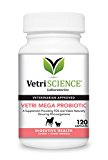 VetriScience is a popular dog probiotic supplement that contains prebiotics and is well-reviewed by other pet owners. It has Fructo-Oligosaccharides (prebiotic) and inulin (soluble dietary fiber). It is a low-calorie, easy way to add a suitable amount to your dog's diet.
VetriScience is a popular dog probiotic supplement that contains prebiotics and is well-reviewed by other pet owners. It has Fructo-Oligosaccharides (prebiotic) and inulin (soluble dietary fiber). It is a low-calorie, easy way to add a suitable amount to your dog's diet.
Fructo-oligosaccharides work because your pet's body can't digest them.
They travel down the digestive system undigested until they are fermented in the large intestine and act to selectively increase the ratio of good bacteria to harmful bacteria.
The molecules produced by the fermentation process create a very healthy environment for good bacteria.
First, ensure your dog needs the supplement, whether probiotics alone or paired with prebiotics.
Doing your due diligence on dogs' prebiotics and consulting with a veterinarian is the best course of action.
Don't buy supplements unless you're sure your pup could benefit from them.
READ NEXT: What Are the Best Probiotics For Dogs and Do Our Pets Need Them?


